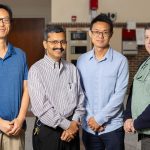
Artificial intelligence (AI) isn’t just used to power electronics, apps or self-driving cars — it’s also driving key innovations in agriculture. From sensors that can monitor soil and water to autonomous robots that can harvest crops, AI is making farming more efficient, sustainable and cost effective.
In an effort to expand the use of AI in agriculture, several UCF researchers will work together to develop several AI-driven technologies that aim to improve the industry’s field operations. The team is supported by a $2.74 million grant from the U.S. Department of Agriculture (USDA) – National Institute of Food and Agriculture (NIFA). The funded project will specifically enhance the agricultural applications produced by the AI Institute for Transforming Workforce and Decision Support (AgAID), an institute funded by NIFA. Professor Manoj Karkee from Washington State University is the team’s leading collaborator of AgAID.
Leading the charge for UCF is Professor Yunjun Xu of the Department of Mechanical and Aerospace Engineering. He will use his expertise to develop AI methods for motion control and scheduling in agricultural robots. These autonomous ground robots are used to conduct several operations in open fields such as detecting diseases and harvesting crops.
Collaborating with Xu are Professor Ladislau Bölöni of the Department of Computer Science and Assistant Professor Chen Chen from the Center for Research in Computer Vision. Bölöni will strive to integrate AI into the manipulation of agricultural robotic arms to improve the way they interact with their physical environment, while Chen will investigate a new AI method for the sensors used in precision agriculture, a farming practice that uses technology to make more accurate and informed decisions.
Also on the project is chemistry Professor Swadeshmukul Santra, who will work with Chen and Xu to integrate AI into the analysis of pesticide residues.
Read article from UCF Today.
By Marisa Ramiccio | March 14, 2024